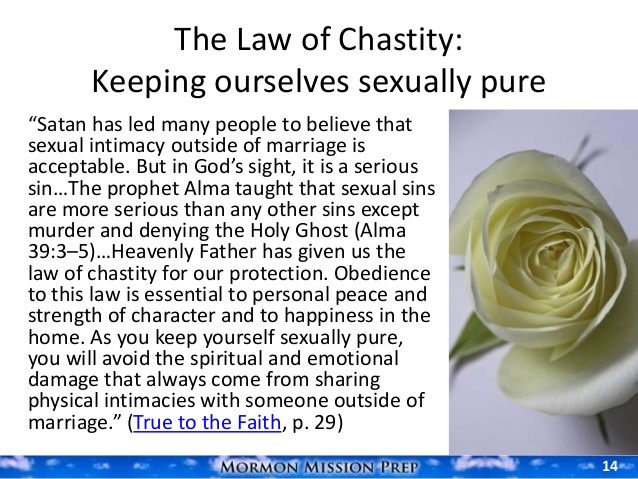
A General Conference Odyssey post for October 1980
I love Hallmark. Yes, a lot of the movies are corny and mushy, but I love the happy family expectation of it all. Oh, wait a minute, they aren’t like that anymore. Now, they’re full of divorce, infidelity, and fairy tale solutions that never really add up to the importance of strong marriage and family relationships. Pixar actually does a better job of that in their animations.
of that in their animations.
Chastity, using restraint and responsibility, seems to be a taboo subject in our world. I recently decided to quit watching a show about a broken family whose mother walked out when the children were young. When a daughter faces an ugly divorce, the father pulls the entire family together, including the dead-beat mother, and suddenly everyone is getting along without even talking about the past. How does that work? But, somewhere, amidst this irresponsible fairy-taling, there still appears to be minor friction because Hollywood simply likes it that way. What messages are they portraying for marriages and families?
Thank goodness we have a prophet who really does teach truth, purpose, and destiny about our marriages and families. And boy, did President Kimball do just that during this October 1980 opening session. In fact, because he had so much to say on the topic, he added an even longer talk about it in both the Ensign and New Era magazine issues the  following month. I’m just going to list the highlights, but I urge you to read these talks for yourself.
following month. I’m just going to list the highlights, but I urge you to read these talks for yourself.
- “So many of the difficulties which beset the family today stem from the breaking of the seventh commandment: ‘Thou shalt not commit adultery’” (Exodus 20:14).
- “Rising generations who have been taught that authority and loving discipline are wrong will not keep the fifth commandment, honoring their fathers and mothers” (see Exodus 20:12).
- “There is no lack of clarity in what the Lord has told us. We cannot shirk. He has placed the responsibility directly where it belongs, and he holds us accountable with regard to the duties of parents to teach their children correct principles and of the need to walk uprightly before the Lord—and there is no substitute for teaching our children by the eloquence of example.”
If that isn’t enough to get you thinking, these are highlights from his even longer talk:
- Necking, Petting, Fornication: “One may do as he pleases, but he cannot evade responsibility.”
- Dating Standards: “Dating and especially steady dating in the early teens is most hazardous. It distorts the whole picture of life.”
- Self-Abuse: “Masturbation, a rather common indiscretion, is not approved of the Lord nor of his church, regardless of what may have been said by others whose ‘norms’ are lower.”
- Homosexuality: “If one has such desires and tendencies, he overcomes them the same as if he had the urge toward petting or fornication or adultery.”
- Repentance: “The discontinuance must be a permanent one. True repentance does not permit repetition.”
These are his final, pleading words:
“We pray for you that you will keep yourselves clean. Clean—we mean clean from beginning to end. Free from all the ugly things the world is pushing upon us—the drugs, and drinking, and smoking, the vulgarity, the pornography—all those things you don’t need to participate in. You must
not give yourselves to them. Put on the full armor of God.”
I close with my own testimony that the family is ordained of God and must be kept sacred and protected. Satan knows that if he can destroy individuals, he will destroy families. He also knows if he can destroy families, he will destroy our Heavenly Father’s Plan of Salvation. But because Jesus Christ came, fulfilled His mission literally saving the world, He will win the war. And because of Jesus Christ, we can choose for ourselves, using restraint and responsibility, to repent, be redeemed, become better people, and have our families with us for eternity.
Additional posts:
Space Marilyn Nielson
Fellow Saints, Not Fellow Citizens G
Of Families and Cultures Nathaniel Givens
Thank you. I am sorry that Hallmark has gone the wrong way. Their movies used to be so wonderful to watch.
We sure need Pres. Kimball’s directness today! Thanks for sharing. (By the way, I think of him as “my” prophet because he signed my mission call!)